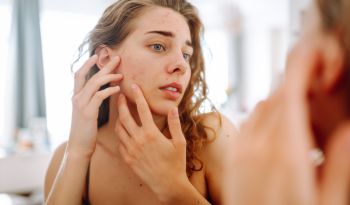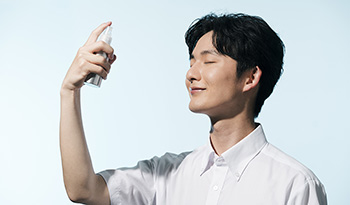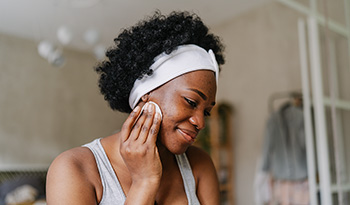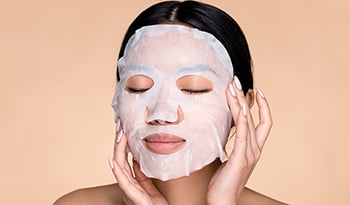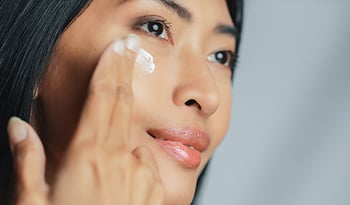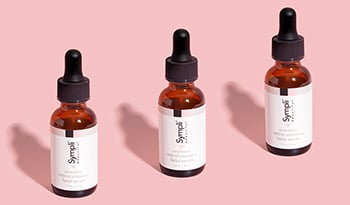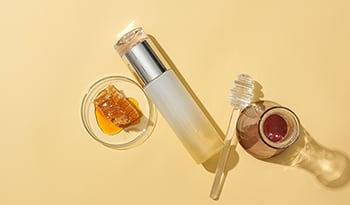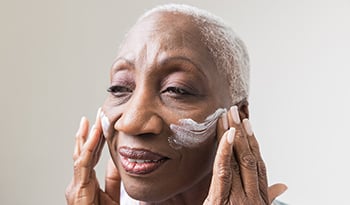Top Tips for Addressing Acne from the Inside Out
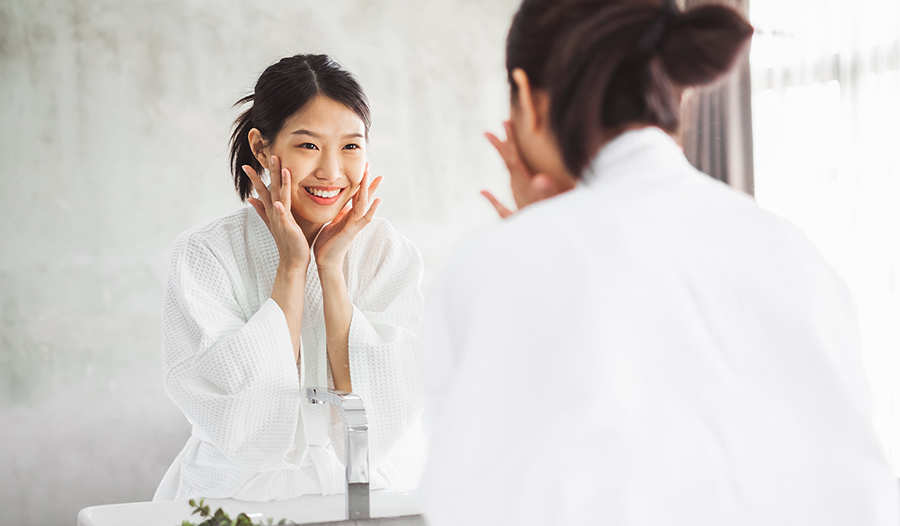
Acne affects roughly 9.4% of the population, making it the eighth-most prevalent condition worldwide.1 Acne typically begins in puberty when oil glands are activated but can occur at any stage of life, including adulthood. Acne typically develops in areas where there are more sebaceous, or oil, glands including the face, chest, arms, and back. Many factors play a role in the development of acne, including genetics, environmental exposures, inflammation, excess oil production, hormone imbalances, bacteria, and excess dead skin clogging hair follicles. Acne can come in the form of blackheads or whiteheads, which are non-inflammatory. Inflammatory acne can take to form of pustules, papules, nodules, and cysts. Cystic acne is a more severe form of acne that results in enlarged cysts and nodules that develop on the skin. This type of acne tends to be more painful and forms when oil and dead skin cells build up in the pores or hair follicles.
The Role of Diet and Skin Health
The old adage “You are what you eat” is particularly fitting when discussing acne and skin health. What you eat may have an influence on the health of your skin. Some studies suggest that diet might play a role in the development and prevention of acne. Eating a diet rich in fruits, vegetables, and low glycemic foods may be helpful in promoting clearer skin.2 Eating foods that are high in the glycemic index may cause a spike in blood sugar. This fluctuation in blood sugar may affect hormones that promote oil production and promote inflammation which can lead to the production of acne.3 Focusing on whole, unprocessed foods and supplements may play a role in fighting acne and obtaining a clear complexion.
6 Supplements for Acne
Probiotics
Our gut microbiome may play a part in our skin health as well. Probiotics may be used to help support healthy good bacteria in our gastrointestinal tract and may support a healthy immune system.4 Several studies suggest Probiotics may be useful in addressing acne. One study showed that people with acne had lower levels of lactobacillus and bifidobacterium.5 Normal skin is slightly acidic to prevent the formation of pathogenic bacteria. Probiotics may also be useful in restoring skin back to a normal pH.6
Vitamin A
Vitamin A is a fat-soluble vitamin that is found naturally in certain foods. Animal and fish sources are highest in the most usable form. Beef liver contains the highest animal source of the active form of Vitamin A. Cod liver oil is also high in Vitamin A. Plant foods contain carotenoids, which can be converted into Vitamin A in the body. Carotenoids are pigments that give fruits and vegetables their yellow, red, or orange color, including carrots, yellow and red peppers, yams, and sweet potatoes. Several studies suggest supplementing with higher doses of Vitamin A might be effective in the treatment of acne.
Vitamin E
Vitamin E is another fat-soluble vitamin. Vitamin E can be found in foods such as nuts and seeds and green leafy vegetables. The most studied form of vitamin E is alpha-tocopherol. Vitamin E is an antioxidant that may also have anti-inflammatory actions. One study suggests people with acne may also have low levels of both Vitamin A and Vitamin E.7 A few studies suggest taking Vitamin E may enhance the benefits of Vitamin A and decrease possible side effects while addressing acne and other skin conditions.8
Zinc
Zinc is an essential trace element that is involved in over 100 bodily processes including DNA expression, immune system, and metabolism. Zinc plays a big part in wound healing and skin health. Zinc is highest in meats, shellfish, seeds, and legumes. Research suggests that people with acne may have lower levels of zinc. A recent review suggests that oral and topical supplementation with zinc may have a positive effect on acne by decreasing inflammation and sebum production.9
Fish Oil
Omega 6 and Omega 3 are essential fatty acids. Maintaining a healthy ratio between Omega 6 and Omega 3 is important for the regulation of inflammatory pathways. Two important types of Omega 3 are eicosapentaenoic acid (EPA) and docosahexaenoic acid (DHA). Several studies suggest that supplementation with Omega 3 may help decrease inflammation and improve acne lesions.10
Vitamin B6
Vitamin B6, also known as pyridoxine, is a water-soluble vitamin. Vitamin B6 is a cofactor involved in many bodily processes including immune and brain health, processing of homocysteine, and the breakdown of proteins, carbohydrates, and fats. Vitamin B6 is important for skin health. It may also be useful in addressing common symptoms associated with premenstrual syndrome (PMS). One study suggests B6 may help to reduce premenstrual related acne in women.11
Managing Stress
There may be a reason why adult acne is on the rise: stress. Stress is regulated by our adrenal glands, which are tiny glands located on top of our kidneys. They release cortisol, which is our fight or flight hormone. Chronic stress may cause a cortisol spike, which may indirectly lead to hormone fluctuations that promote acne production. One study suggests cortisol can increase sebum production, worsening acne.12
Adaptogenic herbs may also be useful in regulating the stress response and managing cortisol. A 2014 study shows that ashwagandha, an Ayurvedic herb, may be useful in decreasing overall stress.13 Several studies on other adaptogenic herbs including Siberian Ginseng, Holy Basil, Rhodiola, and Schisandra may also be effective in managing cortisol and the stress response.14
A Healthy Skincare Routine
Maintaining a healthy skincare routine can be helpful in treating and preventing acne. Several topical cosmeceutical compounds have been studied for their acne-fighting abilities.
Retinol
Retinol is a biologically active form of Vitamin A that can be used topically to address acne and other skin issues such as fine lines and wrinkles. Retinols may help to rejuvenate the skin by increasing cell proliferation and may be helpful in addressing acne and acne scarring.15 Retinols are typically combined with other products for a comprehensive acne protocol.
Salicylic Acid
Salicylic acid is commonly found in many topical acne products, including cleansers, toners, and lotions. Salicylic acid is a type of beta-hydroxy acid derived from the willow tree bark. It exfoliates dead skin while dissolving excess oil and debris from the skin’s surface, and may reduce pore size. One study suggests topical use of salicylic acid for 12 weeks may reduce the appearance of inflammatory acne lesions.15
Glycolic Acid
Glycolic acid is a type of alpha hydroxy acid (AHA) that is derived from sugar cane. It is one of the most common and well-known acids in the skincare industry. Because of its tiny particle size, glycolic acid can help to exfoliate dead skin and reduce hyperkeratinization more effectively than other AHAs.15 It may help to unclog pores and clear acne breakouts.
Sulphur
Sulphur is a nonmetal element found predominately in soil. Sulphur is found widely in many over-the-counter products. It can have a drying effect and may help absorb excess oil on the skin’s surface. Some studies suggest sulphur may also have antibacterial properties that may make it effective for acne treatment.16 Sulphur is often combined with other active ingredients including salicylic acid.
Niacinamide
Niacinamide is a form of Vitamin B3, a water-soluble vitamin. Niacinamide is believed to display anti-inflammatory properties and may prevent trans-epidermal water loss. Several studies suggest topical niacinamide may be as effective in reducing acne as other first-line acne treatments.17 Niacinamide may improve the appearance of acne lesions without irritation or side effects of other topical acne treatments.
References:
- Tan, JKL, Bhate, K. A Global Perspective on the Epidemiology of Acne. Br J Dermatol. 2015 Jul;172 Suppl 1:3-12. doi:10.1111/bjd.13462. Accessed 7/5/2020.
- Pappas, Apostolos. The relationship of diet and acne. Dermatoendocrinol. 2009 Sep-Oct; 1(5): 262-267. doi: Accessed 7/2/2020.
- UW Integrative Health. Acne and Your Diet: How the Glycemic Index Affects Your Skin. September 11.2005. Accessed 7/2/2020.
- Zanteson, L. Gut Health and Immunity- It's all about the good bacteria that can help fight disease. June 2012. . Accessed 6/17/2020.
- Yan, Hui-Min, Zhao, Hui-Juan, Guo, Du-Yi, Zhu, Pei-Qiu, Zhang, Chun-Lei, Jiang-Wei. Gut Microbiota Alterations in Moderate to Severe Acne Vulgaris Patients. J Dermatol 2018 Oct;45(10):1166-1171. doi: 10.1111/1346-8138.14586. Epub August 13, 2018.. Accessed 7/5/2020.
- Kober, Mary-Margaret, Bowe, Whitney. The effect of probiotics on immune regulation, acne, and photoaging. Int J Womens Dermatol. 2015 Jun; 1(2): 85-89. /. Accessed 7/2/2020.
- El-Akawi, Z, Abdel-Latif, N, Abdul-Razzak, K. Does the Plasma Level of Vitamins A and E Affect Acne Condition. Clin Exp Dermatol. 2006 May;31(3):430-4. doi: 10.1111/j.1365-2230.2006.02106.x. . Accessed 7/1/2020.
- Keen, Mohammad Abid, Hassan, Iffat. Vitamin E in Dermatology. Indian Dermatol Online J. 2016 Jul-Aug; 7(4): 311-315. doi: 10.4103/2229-5178.185494. Accessed 7/6/2020.
- Brandt, Staci. The Clinical Effects of Zinc as a Topical or Oral Agent on the Clinical Response and Pathophysiologic Mechanism of Acne: A Systematic Review of the Literature. . Accessed. 7/6/2020.
- Kucharska, Alicja, Szmurlo, Agnieszka, Sinska, Beata. Significance of diet in treated and untreated acne vulgaris. Postepy Dermatol Alergol. 2016 Apr; 33(2): 81-86. Accessed 7/6/2020.
- Fathizadeh, Nahid, MSc, Ebrahimi, Elham, Valiani, Magboube, MSc, Tavakoli, Naser, PhD, Yar, Manizhe Hojat, BS. Evaluating the effect of magnesium and magnesium plus vitamin B6 supplement on the severity of premenstrual syndrome. Iran J Nurs Midwifery Res. 2010 Dec; 15(Suppl1): 401-405. Accessed 7/6/2020.
- Chen, Ying, Lyga, John. Brain-Skin Connection: Stress, Inflammation and Skin Aging. Inflamm Allergy Drug Targets. 2014 Jun; 13(3): 177-19. Accessed 7/6/2020.
- Pratte, M, Nanavati, K, Young, V, Morley, Can Alternative Treatment for Anxiety: A Systematic Review of Human Trial Results Reported for the Ayurvedic Herb Ashwagandha. J Altern Complement Med. 2014 Dec 1; 20(12):901-908. Accessed 7/1/2020.
- Liao, Lian-ying, He, Yi-fan, Meng, Hong, Dong, Yin-mao, Yi, Fan, Xiao, Pei-gen. A preliminary review of studies on adaptogens: comparison of their bioactivity in TCM with that of ginseng-like herbs used worldwide. Chin Med. 2018;13:57. Published online 2018 Nov 16. doi: 10.1186/s13020-018-0214-9. 7/1/2020.
- Decker, Ashely, BS, MA, Graber, Emmy, MD. Over-the-counter Acne Treatments. The Journal of Clinical and Aesthetic Dermatology. 2012 May; 5(5):32-40. Accessed 7/6/2020.
- Gupta, AK, Nicol, K. The use of sulfur in dermatology. J Drugs Dermatol. 2004 Jul-Aug;3(4):427-431. Accessed 7/6/2020.
- Walocko, Frances M, Eber, Ariel E, Keri Jonette E, Al-Harbi, Mana A, Nouri, Keyvan. The Role of Nicotinamide in Acne Treatment. Dermatol Ther 2017 Sep;30(5). doi: 10.1111/dth.12481. Epub February 17, 2017. Accessed 7/6/2020.
DISCLAIMER:This Wellness Hub does not intend to provide diagnosis...















































































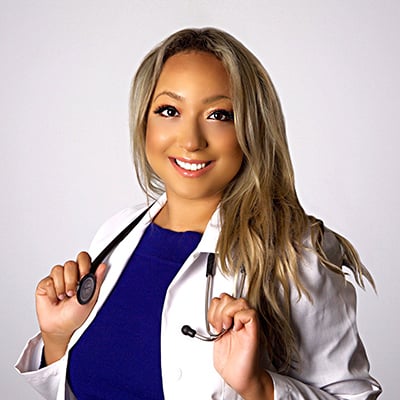
 Table of Contents
Table of Contents




